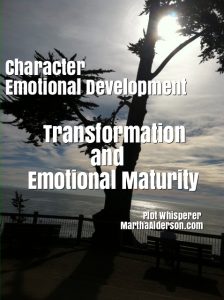The emotional steadiness your protagonist develops in a story (character emotional development plot) comes from all that happens to her (dramatic action plot). Character emotional development: transformation and emotional maturity, I call change, maturity, transformation, transcendence. (Your genre and your story — action-driven | character-driven — define the level of character development that fits your story’s underlying meaning.) Character emotional development toward transformation and emotional maturity evolves over time from all that happens to her in the story.

In the Middle
The lessons she learns in the middle, having suffered greatly and paid dearly, lead to this change at the end of the story. All of the lessons and wisdom and skills and abilities she learns are critical for her ultimate success at the Climax.
Some abilities and skills are external and necessary to complete the dramatic action plot. Others are internal. All of the internal lessons and wisdom gained point directly to emotional maturity. Emotions continually trip her up in the beginning and then fell her toward the end of the middle of the story. The protagonist demonstrates emotional maturity in her ability to understand and manage those same emotions at the end of the story.
Backstory Wound
Characters have often endured trauma, deception, abandonment, betrayal, abuse, pain, loss, sadness either before the story begins or during the story. Left unhealed, this backstory wound typically become emotionally stuck at the time and place of the trauma. For her to achieve her goal, she must first become conscious of her backstory wound. Ultimately, she moves towards healing the past in order to successfully move into the future.
Character Emotional Development: Transformation and Emotional Maturity
The following are some traits that point to emotional immaturity (as shown in the beginning and deepened in the middle of the story) compared to emotional maturity (as shown at the end of the story):
- Own Desires versus Delayed Gratification = Ability to keep long-term commitments
- Blaming versus Responsible = Acceptance of current life circumstances as a result of personal decisions
- Intellect versus Intuition = “Feel” a solution and create the best course of action
- Reactive versus Proactive = Thoughtful decision-making
- Know it all versus Open-Minded = Desire to learn and seek counsel
- Rigid versus Adaptable = Willing to be flexible. Open to change
- Self-conscious versus We are All One = Possesses a spirit of humility and compassion
- Narrow-minded versus Alternative Views = Open to others’ opinions and views
- Critical versus Non-judgemental = Respect for others’ right to their beliefs
- Entitled versus Grateful = Appreciative
- Shutdown versus Resilient = Express disappointments, plot a plan, move forward
- Erratic Mood Swings versus Emotional Steadiness = Peaceful state of mind
- Uncooperative versus Team player = Willingness to seek out opportunities with others
- Shutdown versus Approachable = Open to new relationships
- Shaken versus Steady = Secure in yourself
- Intense versus Humor = Not taking yourself too seriously
~~~~~~~~

Follow Me!